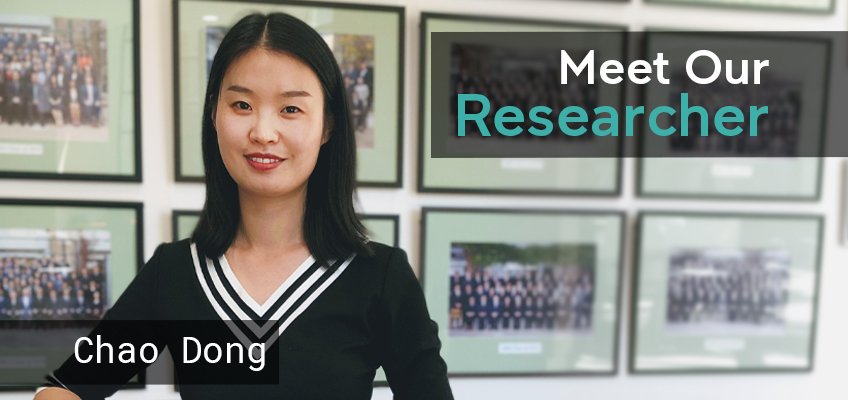02 Mar 2021

A PhD Candidate in the Brain Ageing Research Laboratory at CHeBA, Chao Dong is investigating an area of brain ageing that may lead to better understanding of how genetic risk factors are related to ageing. Chao hopes that her research will not only help people suffering from age-related disease, but also lead to disease prevention and long-term health outcomes.
How did you get into researching the ageing brain?
My study background is in Biomedical engineering. When I completed my Bachelor’s degree, I was eager to pursue further studies. I have always been very interested in the complexity and mystery of the human brain and my research career in human brain ageing commenced as a Masters student in Beihang University. During my Masters, I became fascinated with analysing brain functional MRI data and assessing the interesting results. During that time, to ensure I established a clear plan for my future career, I was an intern at a health care company and also had a role as a research assistant which helped me gain valuable work experience. After some trial and error, I finally discovered what I was really passionate about and then made the choice =to pursue research into the ageing brain. I started my PhD research at CHeBA in 2020 and it was from this point that my research journey really got started.
Did you experience a ‘defining moment’ which led you to this field?
I think the research experience I had during my master’s degree was what led me to this field. I did not have a great deal of neuroimaging knowledge when I started my first research project, but I kept learning under the guidance of my supervisor. Gradually, I became more interested in brain ageing research. Importantly, I feel a great sense of achievement working in this field knowing that it may help people have a better understanding of ageing. This has also solidified my determination to pursue my research career in this field.
I love talking with the elderly and I find I always learn a lot during those conversations. I think their experience and wisdom are valuable assets to society. I will be extremely happy if our research can lead to aged people having a healthier life, even if our contribution is small.

Do you have any personal interests or activities which are protective behaviours against cognitive decline?
I am a big fan of detective movies and I find that watching this genre of film is a good way for me to relieve stress. I enjoy regular exercise, which helps me maintain a degree of fitness and positive mindset. Physical activity has been shown to be protective against cognitive decline. Some of the activities I regularly participate in are bowling, badminton and tennis.
I have recently been learning Spanish which I am finding very interesting. Research indicates that learning multiple languages may protect against cognitive decline and dementia. During the pandemic, I have also spent more time learning how to cook unusual Chinese cuisines which is also cognitively challenging. My improvement in cooking has been a big surprise to my parents! Additionally, I really enjoy being close to nature. I prefer to walk along the beach or run in the park in a sunny day, which is a great way to recharge my battery.
What are you currently researching?
My current research is applying multi-modal neuroimaging and genetic data to explore human longevity and brain ageing. This interdisciplinary research is highly motivating for me to step outside of my comfort zone and acquire new knowledge.
Why is your research important?
Human longevity, ageing and resistance to disease are influenced by both environmental and genetic factors. My research aims to increase our understanding of how genetics influences healthy brain ageing and longevity by studying neuroimaging in middle-aged and older adults.
I hope that my work will ultimately help to promote brain health in our ageing population.
What do you love about working for CHeBA?
I love studying and working at CHeBA and find it highly collaborative. My supervisors and colleagues are very friendly and are always ready to help each other. I have been working at CHeBA for almost one year and have consistently found the people to provide enormous support, both professionally and emotionally.
What is the ultimate hope you have for your research?
As increasing life expectancy and population growth has become a worldwide trend, I hope my research will be a valuable contribution to human ageing research, and ultimately help people suffering from ageing-related disease. By interrogating multi-modal neuroimaging and genetics data, my hope is that we can move research discovery studies to clinical research studies and help not only with disease prevention and diagnosis, but also provide effective long-term health outcomes.
This interview was undertaken during the COVID-19 work from home period. Chao Dong found that learning and sharing new cooking techniques with friends and family supported her mental resilience and kept her feeling socially connected while physically isolated.
Donations are fundamental for critical research to continue following COVID-19.
If you would like to discuss supporting Chao Dong's work specifically, or would like information
on leaving a legacy via a Gift in your Will, please contact h.douglass@unsw.edu.au.

Chao Dong is a Scientia PhD student at CHeBA working both within the Neuroimaging Group, and the Genetics and Epigenomics Group. She is supervised by Associate Professor Wei Wen, Dr Karen Mather, Dr Anbupalam Thalamuthu, Dr Jiyang Jiang and Professor Perminder Sachdev. She completed a Bachelor of Engineering at Shandong University of Science and Technology and a Master of Engineering in Beihang University in China. The topic of her PhD is to investigate the genetic and environmental influences on human brain changes in ageing.
